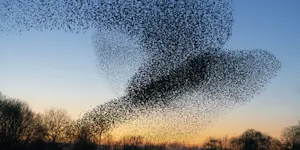What Makes This Word Tick
"Eucatastrophe" is a word that feels like a beacon in a storm, implying a sudden and favorable resolution to an intense story. Coined by J.R.R. Tolkien, it delivers that sweet sense of relief when everything turns out okay—like finding an unexpected $20 bill in your old coat pocket right before paying for your morning coffee.
If Eucatastrophe Were a Person…
This would be the kind of person who shows up at the last minute with a winning lottery ticket when the rent's due. Always bringing sunshine on a cloudy day, they're the embodiment of optimism and uncanny timing—like a guardian angel with a knack for life’s dramatic turns.
How This Word Has Changed Over Time
Originally crafted by Tolkien, "eucatastrophe" hasn’t drifted much from its literary roots. Though it's not commonly used in everyday conversation, its essence has remained steadfast, clinging to that precious narrative twist that turns despair into delight. Over time, it's become a niche favorite among literary enthusiasts and storytelling aficionados.
Old Sayings and Proverbs That Use Eucatastrophe
While there aren't any age-old sayings using "eucatastrophe," the sentiment can be found in proverbs like "every cloud has a silver lining" or "it's always darkest before the dawn." These speak to the unexpected positive turns eucatastrophes offer, much like a reassuring whisper that promises better things.
Surprising Facts About Eucatastrophe
Did you know Tolkien considered this word central to his storytelling philosophy? He believed that fairy tales needed this instant stroke of good fortune to fulfill their moral purpose. In essence, the eucatastrophe captivates audiences by satisfying our innate desire for redemption and hope.
Out and About With This Word
You'll find "eucatastrophe" making its rounds in literary discussions and maybe on a bumper sticker for a hardcore Tolkien fan. It’s a beloved term in storytelling workshops and creative writing courses, often making cameo appearances in places obsessed with plot twists and story arcs.
Pop Culture Moments Where Eucatastrophe Was Used
While you might not hear superheroes shout "eucatastrophe!" during an epic battle, the concept is alive and well in movies like "Star Wars" when the Jedi manages to overcome the odds. Or in romantic comedies when the couple inevitably reunites in a grand, tear-inducing finale.
The Word in Literature
"Eucatastrophe" is at home in epic narratives and fantasy novels, where authors delight in crafting intricate tales that spiral towards a redemptive end. Think of the lands concocted by Tolkien himself or the vast universes rolled out in sprawling sagas like "Harry Potter."
Moments in History with Eucatastrophe
Consider the Miracle on the Hudson, where a routine flight turned disastrous only to have all aboard safely rescued—this event could very well be described as a real-world eucatastrophe. It's that grace-filled moment when tragedy is averted that captures the spirit of the word.
This Word Around the World
Other languages might not have a direct translation, but cultures worldwide understand the concept through folklore, parables, and fables that emphasize sudden jubilant turns. It’s a universal motif, like Cinderella's rags becoming riches in a blink.
Where Does It Come From?
The word is a blend of "eu," meaning good, and "catastrophe," typically implying disaster. Tolkien crafted it to define the pivotal event in storytelling where the tide turns unexpectedly for the better—like a cleverly designed literary curveball.
How People Misuse This Word
Sometimes people mistake "eucatastrophe" for just any happy ending, rather than the specific notion of a sudden and miraculous change of fortune. It’s the element of the unexpected and the near-tragic that truly defines it.
Words It’s Often Confused With
Catastrophe: Without the "eu" prefix, this refers strictly to disaster, lacking the redemptive twist.
Serendipity: While both involve positive outcomes, serendipity leans more towards happy coincidences rather than dramatic turnarounds.
Deus Ex Machina: This is a plot device where an unsolvable issue is suddenly resolved by an unexpected intervention, not necessarily carrying the emotional catharsis of a eucatastrophe.
Additional Synonyms and Antonyms
While there are no perfect synonyms, terms like "happy turnaround" capture its essence. Antonyms would include "tragedy" or "disaster," the very outcomes a eucatastrophe averts at the last minute.
Want to Try It Out in a Sentence?
When the final whistle blew, marking their victory in the championship game after an impossible comeback, it felt like a real-life eucatastrophe.
















